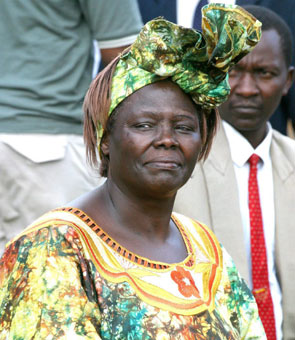
In her memoir Unbowed, Kenyan environmentalist Wangari Maathai recalls her early childhood in the shadow of Mount Kenya. "At the time of my birth, the land around Ihithe was still lush, green and fertile," she writes. "The seasons were so regular that you could almost predict that the long, monsoon rains would start falling in mid-March. In July you knew it would be so foggy you would not be able to see 10 feet in front of you, and so cold in the morning that the grass would be silvery-white with frost."
Decades on, Maathai, the first woman in East Africa to earn a Ph.D., began noticing that the seasons were becoming less dependable and that her country's vegetation was fast disappearing. A population explosion and years of corrupt government were imperiling not just Kenyan society but the land itself. In the late 1970s, Maathai and other women founded a small environmental group called the Green Belt Movement and encouraged people to plant trees — more than 40 million so far — to prevent soil erosion and provide firewood for cooking. They also took on the most powerful man in Kenya then: President Daniel arap Moi, whose ruling party wanted to build an outsized office tower in a park in the capital, Nairobi. Few people gave Maathai much hope of making a difference. But her folksy charm belies a steely resolve, and her group's protests eventually forced the government to drop its plans.
In the years of activism that followed, Maathai was arrested, imprisoned and beaten by hired thugs. In 2002 she won a seat in parliament (Moi retired at the same election), and in 2004 she became the first environmentalist — and the first African woman — to win the Nobel Peace Prize. The Nobel committee cited her "contribution to sustainable development, democracy and peace." At the time, some questioned the link between saving the environment and promoting peace. But millions of Kenyans understood the lesson that Maathai had taught them: that prosperity depends just as much on caring for a fragile planet as on dousing human conflict.